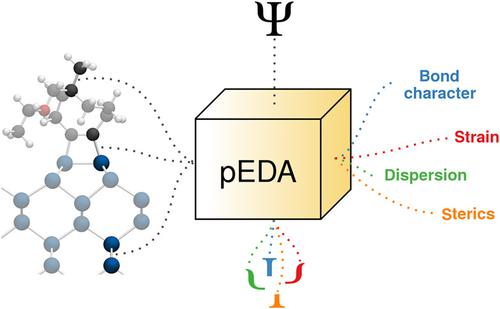当前位置:
X-MOL 学术
›
WIREs Comput. Mol. Sci.
›
论文详情
Our official English website, www.x-mol.net, welcomes your
feedback! (Note: you will need to create a separate account there.)
Deriving bonding concepts for molecules, surfaces, and solids with energy decomposition analysis for extended systems
Wiley Interdisciplinary Reviews: Computational Molecular Science ( IF 16.8 ) Pub Date : 2018-11-16 , DOI: 10.1002/wcms.1401 Lisa Pecher 1 , Ralf Tonner 2
Wiley Interdisciplinary Reviews: Computational Molecular Science ( IF 16.8 ) Pub Date : 2018-11-16 , DOI: 10.1002/wcms.1401 Lisa Pecher 1 , Ralf Tonner 2
Affiliation

|
Chemical bonding concepts like covalency, ionicity, Pauli repulsion, shared‐electron, or donor–acceptor bonding are important tools to sort our vast knowledge in chemistry and predict new reactivity. Electronic structure analysis provides the basis for a detailed understanding of the origins of these concepts. Energy decomposition analysis (EDA) is an established method for molecules and has recently been implemented for application in extended systems, that is, surfaces and solids, where it is termed periodic EDA (pEDA). The foundations and applications of this method which enables the derivation of bonding concepts are outlined in this review. Embedded in key examples from molecular and solid‐state chemistry, the major part covers the adsorption and reactivity of molecules with surfaces with a focus on organic molecules interacting with semiconductor surfaces. Based on electronic structure analysis and supported by a quantitative methodology, we show that analogous bonding concepts can be applied in diverse chemical environments.
中文翻译:

通过扩展系统的能量分解分析推导分子,表面和固体的键合概念
化学键的概念,例如共价键,离子键,保利斥力,电子共享键或供体-受体键,是重要的工具,可用于整理我们对化学的广泛知识并预测新的反应性。电子结构分析为详细理解这些概念的起源提供了基础。能量分解分析(EDA)是一种已建立的分子方法,最近已被实现用于扩展系统(即表面和固体)中,该系统被称为周期性EDA(pEDA)。本文概述了这种方法的基础和应用,该方法可以推导键合概念。嵌入分子和固态化学的关键示例中,主要部分涵盖了分子对表面的吸附和反应性,重点是与半导体表面相互作用的有机分子。基于电子结构分析并得到定量方法的支持,我们证明了类似的键合概念可以应用在多种化学环境中。
更新日期:2018-11-16
中文翻译:

通过扩展系统的能量分解分析推导分子,表面和固体的键合概念
化学键的概念,例如共价键,离子键,保利斥力,电子共享键或供体-受体键,是重要的工具,可用于整理我们对化学的广泛知识并预测新的反应性。电子结构分析为详细理解这些概念的起源提供了基础。能量分解分析(EDA)是一种已建立的分子方法,最近已被实现用于扩展系统(即表面和固体)中,该系统被称为周期性EDA(pEDA)。本文概述了这种方法的基础和应用,该方法可以推导键合概念。嵌入分子和固态化学的关键示例中,主要部分涵盖了分子对表面的吸附和反应性,重点是与半导体表面相互作用的有机分子。基于电子结构分析并得到定量方法的支持,我们证明了类似的键合概念可以应用在多种化学环境中。











































 京公网安备 11010802027423号
京公网安备 11010802027423号